Backwashing your pool is essential to the health of your pool filter and your pump. Regular backwashing and proper pool maintenance can help you get the most out of your pool filter system.
As a general rule you should backwash your pool filter once a week, normally after vacuuming. If you begin to lose suction when vacuuming this may indicate the need to backwash. You may also need to backwash more often if there are lots of trees nearby that drop lots of dirt and debris.
Pools require a lot of maintenance to run at peak performance, and backwashing is a part of that if you have a pool sand filter. Read on to learn more about this important procedure.
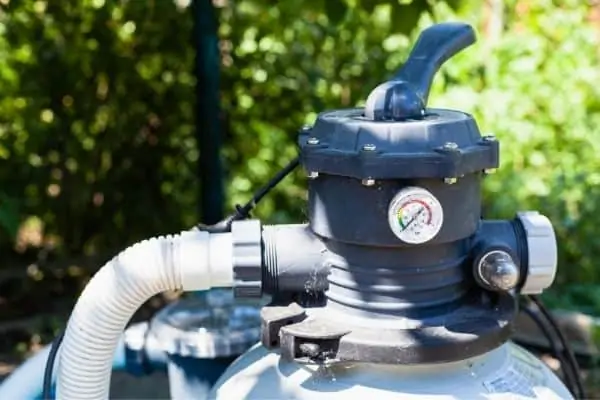

Backwash weekly and as needed
It is best to backwash your pool once a week to keep the filter clean. Many pool owners do this right after they have vacuumed their pool. This helps to keep down debris that might clog the filter.
A swimming pool with a sand filter should also be backwashed after heavy rainstorms. The storms are likely to fill the pool with twigs and leaves, especially if there are trees near your pool. These will clog your filter and cause myriad problems. Backwashing will help to rid the pool and the filter of debris thrown in by the storm.
It is also a good idea to backwash your pool after an algae outbreak. While the backwash cannot eradicate the algae itself, it will help to remove any remaining traces in the filter once the algae outbreak has been treated by the proper methods.
If you begin to lose suction while vacuuming then this may also mean it is time to backwash. Check the pressure gauge on the filter and if it is higher than normal this means there is too much back pressure so go through the backwashing procedure. After you have backwashed the filter system the pressure gauge should show a lower reading.
In addition to these guidelines, your pool may need to be backwashed more often if you live in a dusty area or have many trees in the yard. These conditions will expose your filter to greater levels of debris which may necessitate cleaning it more often.
Can You Backwash A Pool Too Much?
You don’t need to backwash your pool just for the sake of backwashing. If you keep up with your weekly backwashing and vacuuming, your pool shouldn’t need too much more.
You can also decrease the backwashing frequency by keeping a cover over your pool when it is not in use. This will keep out leaves, twigs, and other debris that would need to be removed by your filter. An ounce of prevention is worth a pound of cure, so covering your pool may be the best thing you can do for your pump.
It will keep out the debris that would otherwise clog your filter, so your equipment won’t have to deal with it in the first place. This will reduce the amount of junk that your filter has to remove from the pool.
Generally, if you use a solar pool cover, this will not prevent dust and debris from entering. This is because you will need to hose off the cover before rolling it up so whatever is on the cover will enter the pool.
What Is Backwashing?
When you backwash pool filters it reverses the flow of water in the filter medium to clean out debris that has become lodged in your pool’s filter media. The pool filter collects dirt and debris when the pool water passes through it. As a result, the filter can become clogged which will both restrict the flow of water causing back pressure in the filter housing and will make the filter less effective at removing dust etc.
Small stones and twigs can become lodged in the filter, which makes it have to work harder. When the filtration system has to work harder, the pump has to work harder. Backwashing helps to dislodge the caught debris and send it down the drain.
This keeps your sand pool filter clean longer and helps to extend its life as well as ensuring you have clean water.
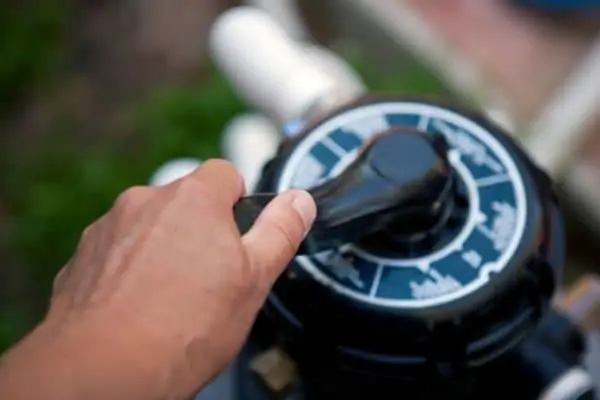
How to backwash
Backwashing a pool is not a difficult job and it is basically the same procedure for a sand filter or to backwash a DE (diatomaceous earth) filter. It simply involves switching the pump on and off at various times when you change the settings on the multiport filter valve. To backwash a filter, follow these steps:
- Turn off the pool pump
- Set the multiport valve to “backwash”
- Roll out or attach backwash hose to filter
- Turn on the pool pump
- Run until water is clear in the filter view glass
- Turn the pool pump off
- Set multiport filter valve to “rinse”
- Turn pool pump back on for 30-60 seconds
- Turn pool pump off
- Reset the filter valve to the “filter” setting
- Roll up or detach backwash hose from the filter
When you backwash a DE (diatomaceous earth) type, some of the DE may be washed out in the backwashing process. Be careful to replace this so that your filter can function at peak capacity.
For full backwashing instructions, with pictures, read my article How to backwash a filter, step by step.
What happens if you don’t backwash your pool?
When debris becomes embedded in the pool filter, the pump has to push harder to get water through the filter. This increases pressure on the pool pump. Over time, this increased pressure will take its toll on the pump and it will also mean you will begin to lose suction in your pool vacuum.
Constantly having to push harder and harder against increased resistance will cause the pump to fail prematurely. The heat from the increased workload of the pump may cause it to burn out.
If you do not backwash your pool regularly, your pool filter will fail to clean the water properly because the filter sand has become so clogged, it can’t hold anymore. Your electric bill will also go up because the increased energy needed to push water through the filter will make the pump pull more electricity.
On top of that, if you never backwash your pool, your filter won’t be able to do its job properly. Therefore, your pool water will not be clean. This can allow an outbreak of algae and bacteria to infest your pool. That means that the water your family plays in will be full of harmful organisms that can make them sick.
Since these organisms enter the body primarily through the nose, your kids will potentially be picking up loads of bacteria to invade their sinuses and cause infections of all kinds.
You can avoid these unpleasant situations by simply backwashing your pool once a week.
When not to backwash a sand filter
There are several reasons why it may not be appropriate to backwash a sand filter:
- If your pool is very dirty, perhaps at the start of the season when you have just opened it
- after a heavy storm that has brought dirt and debris into the pool
- if you have a heavy algae infestation
In these cases, you should bypass the sand filter completely and vacuum directly to waste using the waste setting on the sand filter valve.
Read my post How to vacuum to waste for full instructions on how to do this.
Where does the pool water go when backwashing?
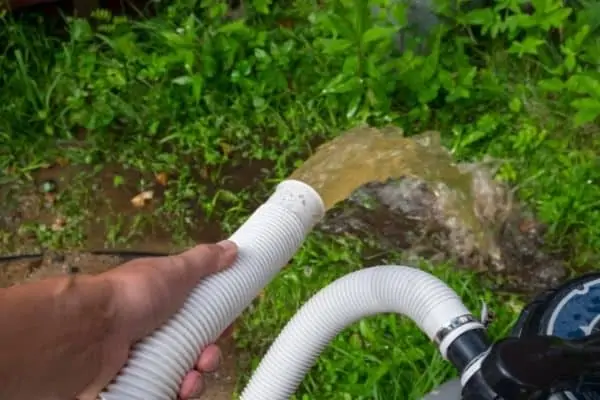
You have a few options to dispose of the backwash water via the waste line, such as:
- If your city officials are okay with it, you could channel it into a storm drain. This would allow it to collect with the rainwater that drains off the streets. But be sure you ask for permission first, or you might find yourself paying a whopping fine.
- If there are dry wells in your area, you could drain the water into them. They would reabsorb it into the groundwater system, where it would be purified by the rocky layers of earth. Again, be sure your city or county officials have no problem with this.
- You might be allowed to drain the backwash water into a plumbing clean out. This would drain the water into your city’s septic system. As always, you would need the city’s permission because if your pool is huge, it might overwhelm your city’s septic system.
- If you live in a rural area, you can build a sort of trench lined with stones. The backwash water can be disposed of there, much like a septic absorption site.
- If you have hardy plants, backwash water can be reused as irrigation.
Be careful not to dispose of it anywhere near streams of water or vegetation that you don’t want to kill. Remember, pool water contains high levels of chlorine and salt, as well as sunscreen residues and other contaminants.
These substances are harmful to the environment and can damage vegetation, in addition to contaminating water sources.
Backwashing clears things up
Anytime you notice your swimming pool water getting cloudy, you need to backwash your pool as a first step. Cloudy water can mean that your filter isn’t doing its job correctly. That is usually because your filter has too much residue trapped inside.
You don’t need to backwash for extended periods; two or three minutes in the backwash position is usually enough. When the water becomes clear in the sight glass, you can shut it off. This will keep your pool clean and healthy for your family to enjoy those summer evening swims.
Poolside days are more fun when the swimming pool is sparkling clean.
Can you backwash a cartridge filter?
Pool cartridges cannot be backwashed in the same way that a sand filter or a DE filter can. Cartridge filters are simply not designed to be run backward.
To clean a cartridge filter you have to turn off the pump, open the cartridge filter housing and remove the filter. You should then rinse and spray the cartridges with a hose. Every few months. you should deep clean the filter, perhaps using Muriatic Acid).
Backwash FAQs
Should you backwash your pool every day?
In normal circumstances backwashing your filter system every day would be excessive. Generally, a pool filter will not need to be backwashed any more frequently than once each week.
Does backwash drain the pool?
When you run your pool filter on the backwash setting then this reverses the flow of water in the filter system and water will be expelled from the pool via waste line. However, since you normally only backwash for a minute or so you will not lose too much water.
How long should I backwash my pool for?
As a general rule of thumb for how long to backwash the pool, it is only necessary to turn on the pump, after moving the pool filter valve to the backwash setting, and run it for two or three minutes. Watch the sight glass and as soon as the water in it starts to run clear then you can stop and reset the filter valve to “filter”.
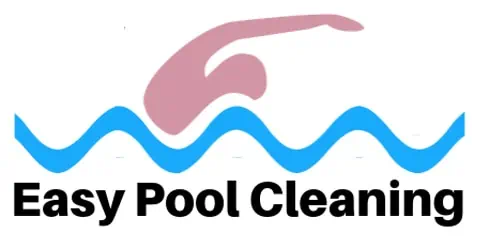

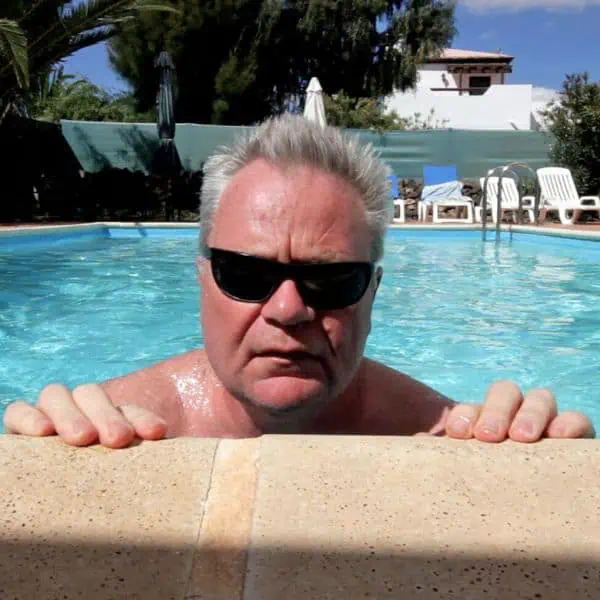



Leave a Reply